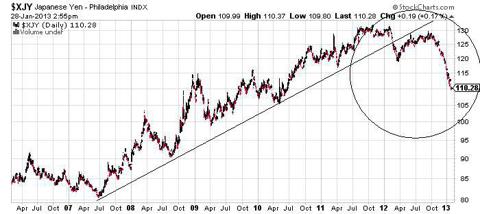Quantitative easing hasn't done much for the "small guy" in the U.S. economy other than create jobs in low-wage-paying sectors, while the "big guys" have enjoyed the propping up of stock prices. Why aren't we looking at the Japanese economy as a lesson? After all, what happened there could very well become the fate of the U.S. economy.
Our Federal Reserve unleashed multiple rounds of quantitative easing and so did the Japanese central bank when the country's crisis hit back in the 1990s. But after eight rounds of money printing, the Japanese economy is back in recession.
What happened in the Japanese economy as it printed money? Its currency, instead of going down in value against other world currencies, went up in value. But all that is changing now. Just look at this chart:
Chart courtesy of StockCharts.com
The Japanese yen has been rising in value since July of 2007. But starting in 2012, the yen collapsed as the Japanese decided to go "no holds barred" on quantitative easing. The Japanese yen declined in value significantly compared to other major currencies from a high of 130 in October 2011 to 110 today.
Since the Federal Reserve announced its first round of quantitative easing, the U.S. dollar has only declined about 11% against a basket of other major world currencies. But, as we see from the chart above (the Japanese "lesson" as I call it), it does not take much for the market to lose faith in a country's currency. The yen has fallen 15% in just over a year.
My skepticism about what the Federal Reserve is doing grows as I see the Japanese economy continue to suffer even after multiple rounds of quantitative easing and almost two decades of artificially low interest rates. Quantitative easing hasn't worked for the Japanese economy; the chances of it working for the U.S. economy are bleak in my opinion.
Actually, by increasing its balance to almost $3.0 trillion, the Federal Reserve may have caused a bubble in the stock market.
On the other hand, the Federal Reserve may have no other option but to continue creating money, as the U.S. government needs the money to pay its bills-the government issues bonds, and the Federal Reserve buys the bonds and gives money to the government.
If quantitative easing can bring economic growth to the U.S. economy, then where is it? Why is the jobs market still tormented? Why are businesses stockpiling cash instead of reinvesting it? Why are real incomes declining? Why has the housing market become a playground for big financial institutions instead of homeowners? And why did the U.S. economy unexpectedly contract in the fourth quarter of 2012? Sounds more and more like Japan's "lost decade" to me.
Where the Market Stands; Where it's Headed:
Was Tuesday the top for the stock market? We'll soon find out. On Wednesday, the Dow Jones Industrial Average hit a new post-credit crisis high of 13,969. Since then, the market has come down as companies earnings have disappointed and reality has set in: the U.S. economy contracted in the fourth quarter of 2012.
We'll see where the market goes from here. But, as I have been writing, we are either at the top or close to it.
What He Said:
The year "2000 was a turning point of consumer confidence in high tech stocks. 2006 will be remembered as the turning point of consumer confidence in the housing market. That means more for-sale signs going up, longer time periods to sell homes, bloated for-sale inventory and eventually lower prices for homes. But this time, the turnaround in consumer confidence will have a bigger impact on the economy. Hold onto your seats, this is going to be a nail biter." Michael Lombardi in Profit Confidential, August 24, 2006. Michael started talking about and predicting the financial catastrophe we began experiencing in 2008 long before anyone else.
